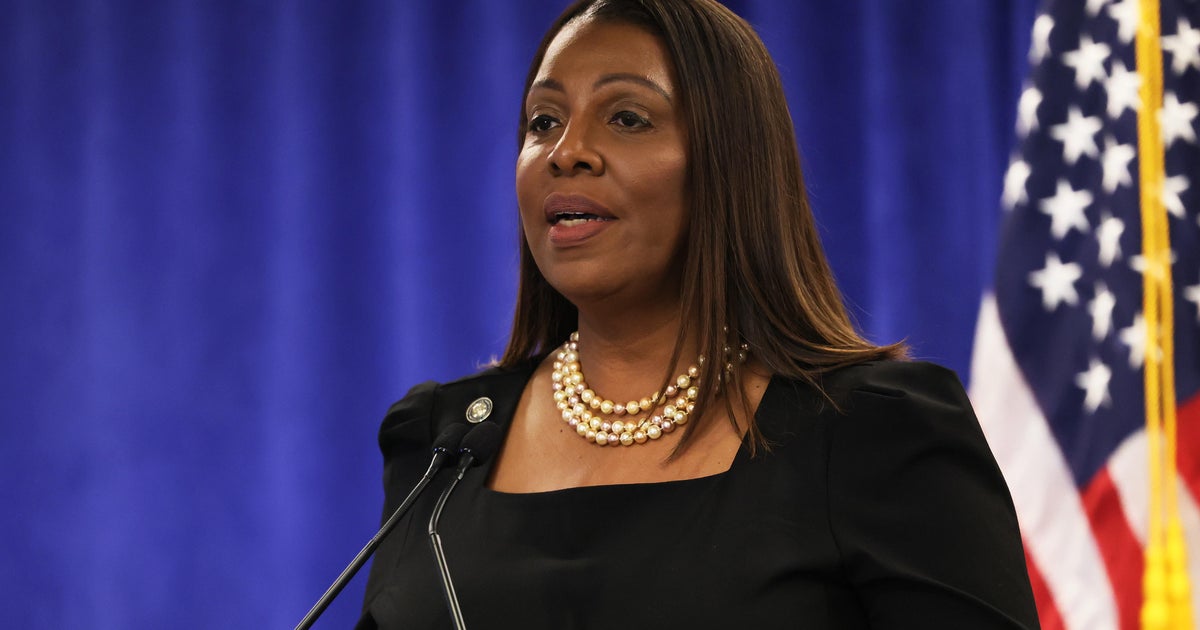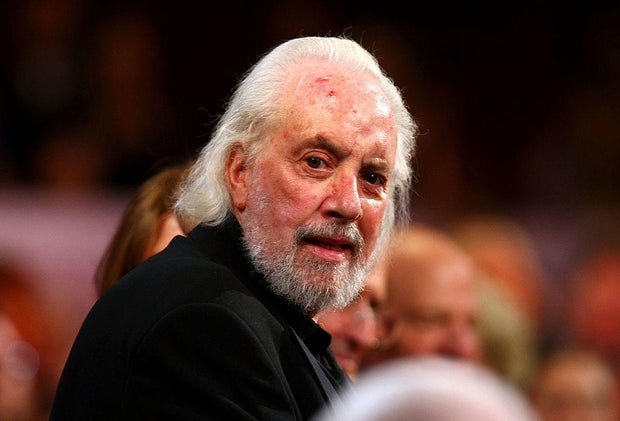CBS News
Trump’s $175 million bond can stand after attorneys agree to comply with new conditions

A New York judge on Monday ruled that the $175 million bond posted by an insurance company for former President Donald Trump in a civil fraud case can stand with assurances by his lawyers to comply with conditions from the Attorney General’s office.
New York Attorney General Letitia James’s office argued it is concerned about the financial wherewithal of Knight Specialty Insurance company, which posted the bond for Trump on April 1.
The agreement should be finalized by Friday, and some of the details require Schwab, the managers of the money market account, to agree to the terms.
A bond is necessary to prevent James’ office from collecting more than $464 million from Trump and other defendants after they were found liable for a decade-long fraud scheme.
In protesting the bond, James’ office said $175 million in cash that Trump claimed to have provided as collateral remained under control of his revocable trust, and not in a Knight account.
Trump Organization lead attorney Chris Kise spoke for about 30 minutes on Monday, assuring the court that the $175 million bond was paid in cash and placed in an interest-bearing money market account that cannot lose value. Kise says the cash account is earning about $400,000 in interest every two weeks.
They said that Trump was still able to make withdrawals, or replace the funds with other assets that could fluctuate with the markets. Attorneys for James said they feared that the bond would no longer be secured if its value were to drop below $175 million.
The attorney general said in a filing on April 19 that she believed that, even if Trump’s funds were under Knight’s control, the company would not meet several requirements for a surety bondholder.
As CBS News has reported, Knight doesn’t appear to meet a restriction under New York insurance law barring companies from putting more than 10% of their capital at risk. The attorney general’s office noted that Knight has a surplus of only $138 million. Under New York law, given that amount of surplus, it may not take on liability of more than $13.8 million.
The attorney general also said that Knight relies on risk transfer practices that work to “artificially” bolster its surplus. James also argued that Knight’s management is untrustworthy, violating federal law “on multiple occasions over the last several years.”
Monday’s hearing came as Trump sat in a courtroom just one block away, listening to opening statements by a Manhattan criminal prosecutor in a different case.
Trump is the first former president in U.S. history to be criminally charged and on trial. The jury in that case were told that prosecutors for Manhattan District Attorney Alvin Bragg would show evidence to support 34 felony counts of falsification of business records. Bragg’s office claims Trump and his then-attorney Michael Cohen conspired to cover up reimbursements after Cohen paid $130,000 to an adult film star, to buy her silence about an alleged sexual encounter with Trump.
Trump has denied all allegations in both cases, and has entered a not guilty plea in the criminal matter. His attorneys have claimed the cases are built on flimsy evidence and have repeatedly attacked Cohen’s credibility. They have accused James and Bragg of going after Trump as part of a “witch hunt” effort to hurt Trump’s chances of winning the presidency in 2024.
CBS News
7/2: CBS Evening News – CBS News

Watch CBS News
Be the first to know
Get browser notifications for breaking news, live events, and exclusive reporting.
CBS News
Robert Towne, legendary Hollywood screenwriter of “Chinatown,” dies at 89

Robert Towne, the Oscar-winning screenplay writer of “Shampoo,” “The Last Detail” and other acclaimed films whose work on “Chinatown” became a model of the art form and helped define the jaded allure of his native Los Angeles, has died. He was 89.
Towne “passed away peacefully surrounded by his loving family” Monday at his home in Los Angeles, his publicist Carri McClure, told CBS News in a statement. She did not provide a cause of death.
In an industry which gave birth to rueful jokes about the writer’s status, Towne for a time held prestige comparable to the actors and directors he worked with. Through his friendships with two of the biggest stars of the 1960s and ’70s, Warren Beatty and Jack Nicholson, he wrote or co-wrote some of the signature films of an era when artists held an unusual level of creative control. The rare “auteur” among screen writers, Towne managed to bring a highly personal and influential vision of Los Angeles onto the screen.
Alberto E. Rodriguez/Getty Images for AFI
“It’s a city that’s so illusory,” Towne told The Associated Press in a 2006 interview. “It’s the westernmost west of America. It’s a sort of place of last resort. It’s a place where, in a word, people go to make their dreams come true. And they’re forever disappointed.”
Recognizable around Hollywood for his high forehead and full beard, Towne won an Academy Award for “Chinatown” and was nominated three other times, for “The Last Detail,” “Shampoo” and “Greystoke.” In 1997, he received a lifetime achievement award from the Writers Guild of America.
“His life, like the characters he created, was incisive, iconoclastic and entirely (original),” said “Shampoo” actor Lee Grant on X.
Towne was born Robert Bertram Schwartz in Los Angeles and moved to San Pedro after his father’s business, a dress shop, closed down because of the Great Depression. His father changed the family name to Towne.
Towne’s success came after a long stretch of working in television, including “The Man from U.N.C.L.E” and “The Lloyd Bridges Show,” and on low-budget movies for “B” producer Roger Corman. In a classic show business story, he owed his breakthrough in part to his psychiatrist, through whom he met Beatty, a fellow patient. As Beatty worked on “Bonnie and Clyde,” he brought in Towne for revisions of the Robert Benton-David Newman script and had him on the set while the movie was filmed in Texas.
Towne’s contributions were uncredited for “Bonnie and Clyde,” the landmark crime film released in 1967, and for years he was a favorite ghost writer. He helped out on “The Godfather,” “The Parallax View” and “Heaven Can Wait” among others and referred to himself as a “relief pitcher who could come in for an inning, not pitch the whole game.” But Towne was credited by name for Nicholson’s macho “The Last Detail” and Beatty’s sex comedy “Shampoo” and was immortalized by “Chinatown,” the 1974 thriller set during the Great Depression.
“Chinatown” was directed by Roman Polanski and starred Nicholson as J.J. “Jake” Gittes, a private detective asked to follow the husband of Evelyn Mulwray (played by Faye Dunaway). The husband is chief engineer of the Los Angeles Department of Water and Power and Gittes finds himself caught in a chaotic spiral of corruption and violence, embodied by Evelyn’s ruthless father, Noah Cross (John Huston).
Influenced by the fiction of Raymond Chandler, Towne resurrected the menace and mood of a classic Los Angeles film noir, but cast Gittes’ labyrinthine odyssey across a grander and more insidious portrait of Southern California. Clues accumulate into a timeless detective tale, and lead helplessly to tragedy, summed up by one of the most repeated lines in movie history, words of grim fatalism a devastated Gittes receives from his partner Lawrence Walsh (Joe Mantell): “Forget it, Jake, it’s Chinatown.”
The back story of “Chinatown” has itself become a kind of detective story, explored in producer Robert Evans’ memoir, “The Kid Stays in the Picture”; in Peter Biskind’s “East Riders, Raging Bulls,” a history of 1960s-1970s Hollywood, and in Sam Wasson’s “The Big Goodbye,” dedicated entirely to “Chinatown.” In “The Big Goodbye,” published in 2020, Wasson alleged that Towne was helped extensively by a ghost writer — former college roommate Edward Taylor. According to “The Big Goodbye,” for which Towne declined to be interviewed, Taylor did not ask for credit on the film because his “friendship with Robert” mattered more.
The studios assumed more power after the mid-1970s and Towne’s standing declined. His own efforts at directing, including “Personal Best” and “Tequila Sunrise,” had mixed results. “The Two Jakes,” the long-awaited sequel to “Chinatown,” was a commercial and critical disappointment when released in 1990 and led to a temporary estrangement between Towne and Nicholson.
Around the same time, he agreed to work on a movie far removed from the art-house aspirations of the ’70s, the Don Simpson-Jerry Bruckheimer production “Days of Thunder,” starring Tom Cruise as a race car driver and Robert Duvall as his crew chief. The 1990 movie was famously over budget and mostly panned, although its admirers include Quentin Tarantino and countless racing fans. And Towne’s script popularized an expression used by Duvall after Cruise complains another car slammed him: “He didn’t slam into you, he didn’t bump you, he didn’t nudge you. He rubbed you.
“And rubbin,′ son, is racin.'”
Towne later worked with Cruise on “The Firm” and the first two “Mission: Impossible” movies. His most recent film was “Ask the Dust,” a Los Angeles story he wrote and directed that came out in 2006. Towne was married twice, the second time to Luisa Gaule, and had two children. His brother, Roger Towne, also wrote screenplays, his credits include “The Natural.”
CBS News
Analyzing impact of Supreme Court’s Trump immunity decision

Watch CBS News
Be the first to know
Get browser notifications for breaking news, live events, and exclusive reporting.







